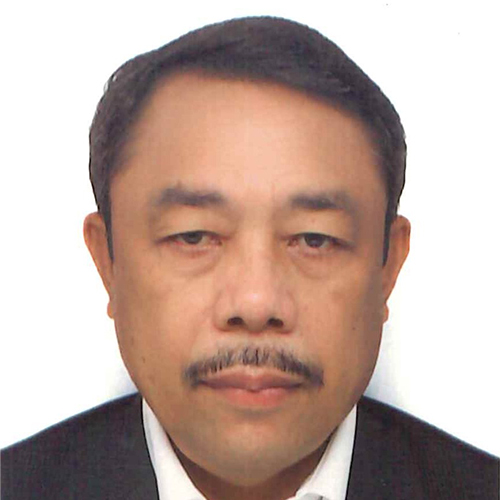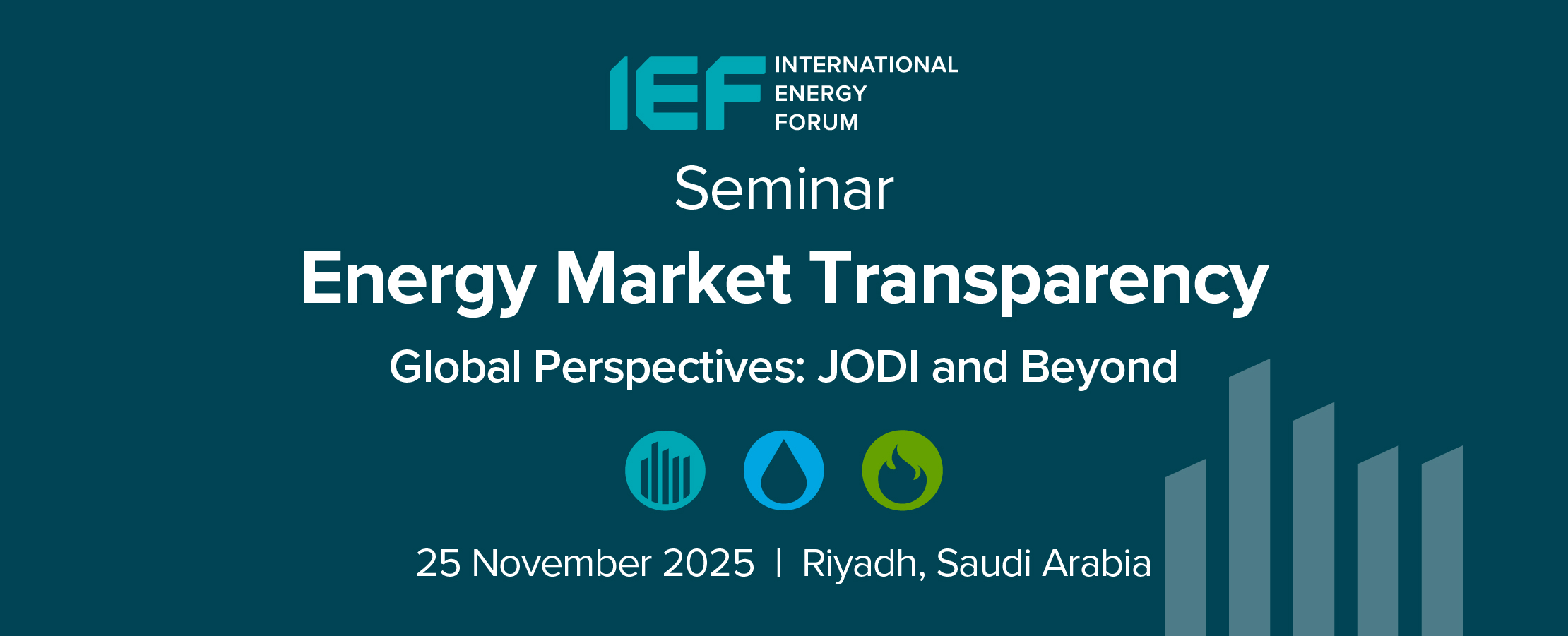Global Perspectives on Energy Market Transparency and Energy Data Reporting: JODI and Beyond
Energy Market Transparency Seminar
Tuesday 25 November 2025
IEF Headquarters, Riyadh, Saudi Arabia
Ensuring energy security, maintaining market stability, and advancing sustainability depends on energy data transparency. Reliable data enables the detection of market imbalances, facilitates effective interventions, boosts investor confidence, and builds trust among international investment and trade partners. Consistent and accurate data reporting of energy market conditions serves as the foundation for informed decision-making by policymakers, investors, and market stakeholders that power world economic growth and prosperity.
To inform effective policy, business, and risk management decisions, data transparency must extend across multiple levels ranging from national statistics and regional inventories to global supply and demand assessments. Primary sources of official energy market data involve robust mechanisms for measuring, reporting and verification and the corresponding institutions that collect and publish statistics in accordance with well-established government regulations and practices. Though energy market transparency has improved over the past decades, government leadership and international collaboration remain vital to deepen collective market insight, overcome persistent data gaps, and improve data reporting capacity, especially in emerging and developing economies.
Alternative tracking, reviewing, and monitoring systems complement official statistics where gaps, reporting delays, or other deficiencies persist. The array of derived data gathering methodologies has become more sophisticated and the choice of secondary sources has broadened significantly.
Accelerated adoption of digital solutions and emerging technologies such as satellites and new remote sensing capabilities combined with Artificial Intelligence (AI), and advanced Big Data analytics are not only reshaping the real-world data landscape but also adding new virtual data dimensions to enhance decision-making and unlock new opportunities. These shifts characterize the forward-looking digital economy, where data is the core strategic asset to drive innovation and competitive advantage. However, though these solutions may bolster energy market transparency and foresight, they continue to rely on official government and corporate statistics that provide both the benchmark and backbone for these systems to reliably inform decisions. Digitalization and alternative metrics, reinforce the need for readily accessible, reliable, and complete historical data made available through statistical agencies and collaborative institutional platforms like the Joint Organizations Data Initiative (JODI).
Moreover, to respond to rising sustainability data reporting requirements, the transformation in the way that governments and businesses collect, report, and utilize data has moved beyond energy security, market stability, and business performance metrics. As traditional approaches to data reporting blend with more dynamic, real-time, and predictive models that support more responsive governance and agile business strategies and enables ever faster, more efficient information exchange, reporting burdens increase but do not always keep pace with reporting capacity.
To deepen understanding of these key developments and how they may help to overcome data gaps and bridge growing divides in reporting practices and regional capabilities, more dialogue and collaboration on energy market transparency is needed.
Objectives
The objective of the Energy Market Transparency Seminar was to share global perspectives on Energy Market Transparency and Energy Data Reporting requirements considering the challenges and opportunities for global energy market transparency in the age of global energy market shifts, transitions, and digitalization. Session discussions debated general market and data technology trends in relation to data reporting requirements and, to seize opportunities and overcome deficiencies, formulate findings for the IEF to advance in collaboration with energy market stakeholders and JODI Partners. This included reflecting key findings and recommendations in an energy market transparency roadmap to advance the Joint Organizations Data Initiative mission and strengthen outreach to relevant organizations and initiatives.
The Seminar convened senior government and industry officials from producer, and consumer countries, and international research centers in addition to JODI Partner Organization focal points and experts, including key digital business representatives.
To achieve a productive dialogue around the future of energy data reporting and identify key trends and findings, the JODI Seminar was structured in four thematic sessions:
- Energy Markets and Data Transparency,
- Energy Markets Data Transparency and Digitalization,
- Benchmarks for Global Energy Market Data Transparency and
- JODI Partner Organization Reflections on the Next Steps to Enhance Global Energy Market Transparency.
Key Questions
- What role does transparency of official data play in enhancing energy security for both producing and consuming countries relative to secondary sources in the digital age?
- How does data transparency influence the stability and efficiency of global energy markets?
- What are the risks and opportunities that digital solutions bring to enhancing energy market data transparency in the next decade?
- How will digital solutions and digital communication tools advance reporting and improve JODI data?
- What are the key opportunities for expanding the coverage and improving the functionality of JODI in the digital age?
- How can JODI Partner Organizations and stakeholders collaborate to strengthen data transparency; on which areas should they focus?
Speakers
Welcome and scene setting
-

Jassim Alshirawi
Secretary General, IEF
Session 1: Energy Markets and Data Transparency
Moderator
-

Adam Sieminski
Senior Advisor to the Board, KAPSARC
Speakers
-

Mohamed Hamel
Secretary General, GECF -

Gertjan ten Broeke
Managing Director, COVA The Netherlands -

Rashid Ali Abdallah
Executive Director, African Energy Commission (AFREC), African Union Commission -

Ichiro Kutani
Senior Research Director, Manager, Global Energy Group1, Director, Energy Security Unit, IEEJ -

Julian Prime
Head of Statistics, IRENA -

Chua Shen Hwee
Director of Data and Analytics Department, Energy Market Authority, Singapore -

Steven Knell
President and Head, Energy Intelligence
Session 2: Energy Markets Data Transparency and Digitalization
Moderator
-

Duncan Millard
Senior International Statistics and Energy Advisor
Speakers
-

Antoine Halff
Chief Analyst & Co-founder, Kayrros -

Muhammad Kiani
Head of MENA advisory, Rystad Energy -

Abdulla Al Abbasi
Director of Energy and Environment Program, Studies and Research Directorate, Derasat -

Fahd Ali Albalawi
Artificial Intelligence Chief Strategy Advisor, SDAIA -

Ren Ke
Ren Ke, Analyst, Big Data Development Department, China State Information Center
Session 3: Benchmarks for Global Energy Market Data Transparency
Moderator
-

Amira Remadna
JODI Coordinator and Senior Analyst, IEF
Speakers
-

Christina Deligianni
Verimpact, CEO & Co-Founder; Policy & Programs Director at the Institute for Sustainable Development, ISD, EPLO -

Tahani Hussain
Group Vice President – Sustainability & ESG, Bapco -

Thomas Smuts Muller
General Manager, Energy Aspects Saudi Arabia -

Abeer Alghamdi
Principal Product and Energy Data Management, KAPSARC -

Erik Rakhou
Energy Advisory Founder & Director, Hydrogen Investor, Rakhou Associates
Session 4: JODI Partner Organization Reflections: A Roadmap to Enhance Global Energy Market Transparency
Speakers
-

Edito Barcelona
Senior Research Fellow and Head of Energy Statistics and Training Office, APEC -

Hichem Kimouche
Head of Data and Information Systems Department, GECF -

Steve Gervais
Senior Data Manager and Head of the Energy Security Data Unit, IEA -

Ivo Nacucchio
Consultant Data and Modeling, OLADE -

Huda Almwasawy
Head of Data Services Department, OPEC -

Mhamed Mouraia
Statistical Systems Coordinator, OPEC -

Pantelis Christodoulides
Senior Statistical Research Analyst, OPEC -

Klaus Stoeger
Senior Statistician, OPEC
Key Findings and Concluding Remarks
-

Christof van Agt Ross
Director of Dialogue, IEF






